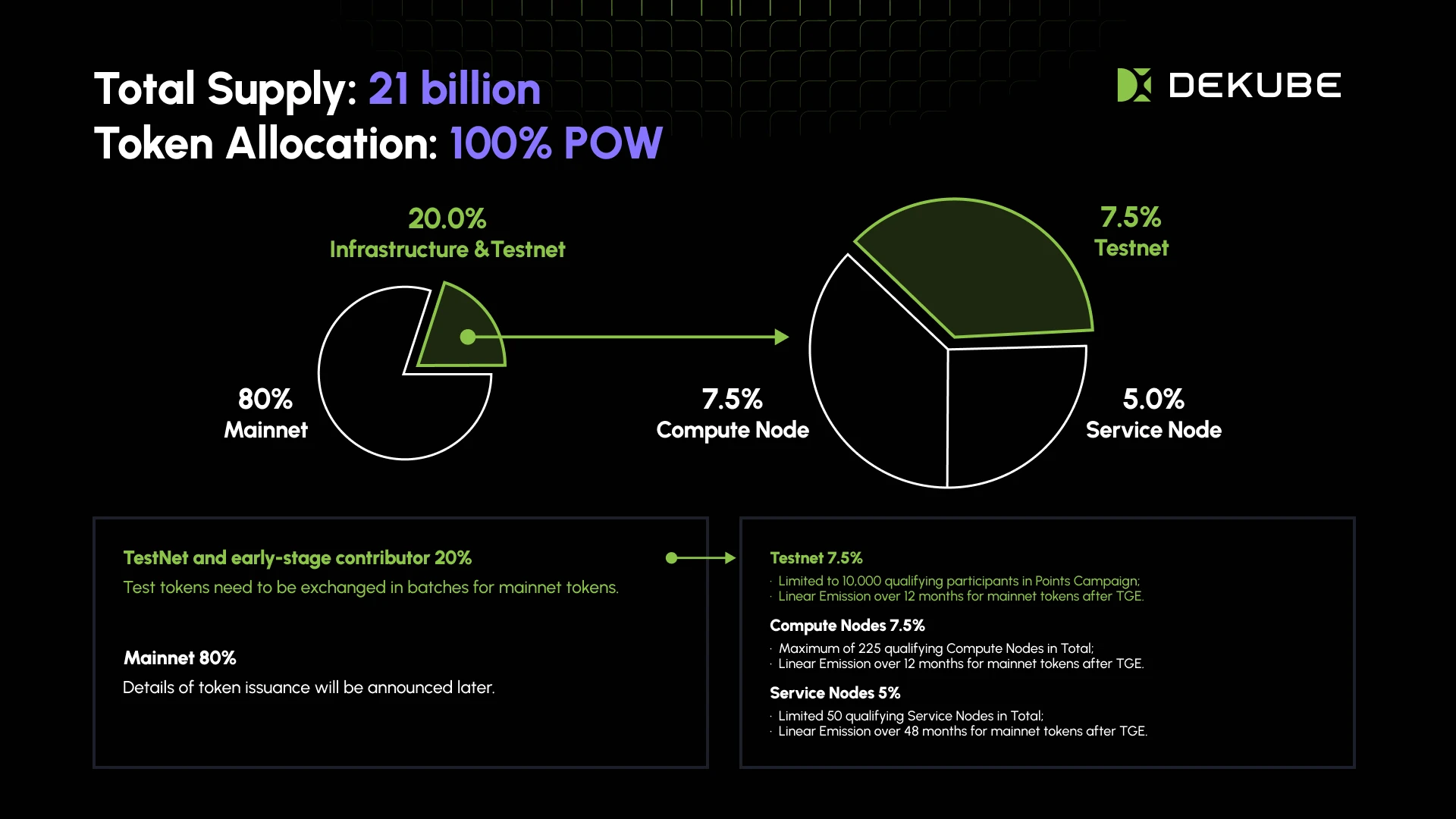100% PoW distributed computing power project DEKUBE: the next rising star in the trillion-dollar DePin track
As a pioneer in the global distributed GPU network, DEKUBE is also the first 100% proof-of-work (PoW) Web3 AI project. By leveraging idle consumer-grade GPUs and transforming them into enterprise-grade computing power, DEKUBE provides an efficient and cost-effective solution for training large language models, pushing the boundaries of AI innovation so that everyone can benefit from it.
Mission: Use technology and vision to popularize AI innovation and benefit the public
Open, democratic, and fair – DEKUBE is committed to changing AI infrastructure and creating one of the worlds largest AI training networks. This innovative use of consumer-grade GPUs enables large-scale distributed AI training, making AI development more democratized. DEKUBE has successfully trained Llama 2 70 B and Grok 314 B, and supports developers worldwide in training Llama 3, making the training of large language models no longer difficult due to the scarcity of computing power, allowing advanced AI technology to be popularized and achieve a major leap forward.
The DEKUBE project has been under development since before 2019, and has its own public chain with a TPS of more than 12,000+. Currently, the core system development is nearing completion. The core developers of the project are strong, started early, and the commercialization process is rapid. The testnet is expected to be launched in July. It is currently in the points activity stage. Points can be exchanged for testnet qualifications, and a certain proportion of tokens will be allocated to participants in the testnet.
Token Allocation and Testnet Incentive Plan
According to DEKUBEs token distribution plan, testnet and early contributors will receive 20% of the test tokens, which need to be exchanged for mainnet tokens in batches. Computing node output accounts for 7.5% of the total, and up to 225 qualified early basic computing nodes will be used to perform GPU integrated AI test tasks. After the release of the TGE mainnet, the tokens will be linearly discharged for 12 months. Service node output accounts for 5%, and a total of 50 qualified service nodes are limited to task management and ensure the stability of the basic network. After the release of the TGE mainnet, the tokens will be linearly issued for 48 months. The technical documentation of node deployment can be found on the official website. Testnet activity output also accounts for 7.5%, limited to the first 10,000 qualified participants, and the tokens will be linearly produced within 12 months after the release of the TGE mainnet. The mainnet token issuance accounts for 80%, and it will be produced through the whole network GPU PoW. Details will be announced later on the official website/official push.
It is worth noting that DEKUBE adopts a 100% PoW mechanism to ensure that token distribution is completely fair and decentralized management. In this system, both individuals and institutions obtain tokens based on the computing workload they contribute, avoiding the unfairness caused by pre-configuration and institutional financing. This not only enhances the transparency of the system, but also enhances the trust of the community, allowing each participant to fairly obtain tokens by contributing computing resources, ensuring the establishment of long-term consensus and the stable development of the community, and achieving decentralization and community friendliness.
Genesis Points 2.0 Event: Team Up, Power Up
DEKUBE is currently running a Genesis Points campaign , with over 60,000 GPUs connected, showing the wide participation of the community and the appeal of the project. By mining points, participants can qualify for the testnet and collect GENESIS points. This campaign not only increases community participation, but also provides valuable data and support for the projects testnet.
In order to further enhance the interactivity and participation of the community, DEKUBE has launched the team cooperation gameplay of Genesis Points 2.0. By forming a team, participants can jointly mine points, open treasure chests, and compete for testnet access. In this cooperation process, they share experiences and strategies to strive for more token rewards and testnet access. In addition, those who participate in GPU team activities have the opportunity to unlock treasure chests, which contain points, USDT, and testnet qualifications.
DEKUBE not only promotes the democratization of AI in technology through its global distributed GPU network, but also strives to build a vibrant and highly engaged community. By leading the transformation of decentralized networks, it opens up an innovative path for the future of AI and works with every community member to explore the greater possibilities of AI+Web3.
This article is sourced from the internet: 100% PoW distributed computing power project DEKUBE: the next rising star in the trillion-dollar DePin track
At 5:00 a.m. Beijing time on May 24, the U.S. Securities and Exchange Commission approved the 19 b-4 forms of multiple Ethereum spot ETFs, including those from BlackRock, Fidelity, and Grayscale. However, although the form has been approved, ETF issuers need to make the S-1 registration statement effective before they can begin trading. A Galaxy Digital report released earlier predicted that the Ethereum spot ETF may be listed on the exchange in July or August. James Seyffart, an ETF analyst at Bloomberg, recently said that it is also possible for the Ethereum spot ETF to be listed in mid-June. Ethereum spot ETF went from being unpopular and having an approval rate of only 7% to an approval rate of 75% overnight, and the price of ETH has repeatedly broken through…










